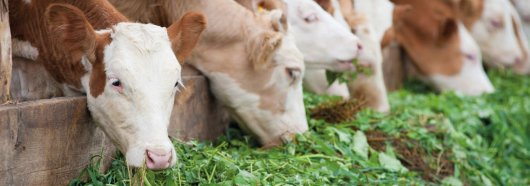CEDERS

Feed management decisions are critical for ruminant production systems and also strongly affect agricultural greenhouse gas (GHG) emissions
Although ruminant management and production conditions differ between countries, a transnational approach is critical for (i) extending knowledge of ruminant dietary effects on GHG emissions and sustainable production, and (ii) improving GHG accounting methodologies. CEDERS (Capturing Effects of Diet on Emissions from Ruminant Systems), a 3-year proposal submitted to FACCE-JPI ERA-GAS, aims to align national agricultural GHG inventory and mitigation research across an international consortium of 9 countries (8 partner countries plus New Zealand). Its main objective is to delineate dietary effects on various on-farm GHG sources and their trade-offs, at the farm and national scales. Specific aims are to:
- develop, expand and refine databases to evaluate dietary mitigation strategies on digestion, excretion, manure composition, and related GHG emissions;
- fill, by experimentation, high-priority knowledge gaps on dietary effects on ruminant and manure emissions;
- evaluate, using monitored farm cases in a modelling platform, the consequences of dietary mitigation measures on total farm GHG emissions;
- improve farm accounting and national inventory methodologies to capture effects of dietary mitigation measures for on-farm GHG emissions; and
- disseminate the implications of these findings to end-users of GHG accounting.
CEDERS’s activities will extend to other countries participating in the ‘Global Network’, ‘Network and Database on Feed and Nutrition in Relation to GHG Emissions’ and ‘Manure Management Network’ (both part of the ‘Global Research Alliance’), FAO and CIRAD. These relationships will aid CEDERS to fill knowledge gaps for future GHG research priorities and inventory methodologies and reporting, to governments, non-governmental and advisory/extension organisations and the ruminant livestock sector.
Coordinator
Wageningen University & Research, The Netherlands
Dr. André Bannink
Project partners
University of Reading, United Kingdom
Institut National de Recherche en Agronomie (INRA), France Aarhus University, Denmark
Swedish University of Agricultural Sciences, Sweden
Leibniz Institute for Farm animal Biology (FBN), Germany Teagasc, Ireland
Natural Resources Institute Finland (LUKE), Finland
AgResearch Ltd, New Zealand
Total requested funding
1,830,000 €
Project duration
36 months
NEWS from CEDERS
2020.05.18

As a satellite of the 7th conference on Greenhouse Gas and Animal Agriculture in Brazil, a workshop was coordinated for a broad audience. Final results of the Global Network project (GN), funded project through the FACCE-JPI Multi-partner Call, as well preliminary results and ongoing activities of the ERA-GAS project CEDERS were presented. The workshop demonstrated the added value of a joint international research activity to capture dietary effects on enteric and excreta related emissions from livestock production in farm GHG accounting and GHG inventory.
Topics presented included the uncertainty in methane and nitrogen measurement techniques (including current activities in EU-SmartCow), in enteric methane prediction equations, and preliminary work from the CEDERS project on prediction equations for enteric methane and excreta, results of experimental work and its implications for GHG accounting and inventory methodology.
Recent CEDERS and previous GN work presented during the workshop involves the following peer-reviewed papers:
https://doi.org/10.1016/j.anifeedsci.2019.114207 (CEDERS/GN)
https://doi.org/10.3168/jds.2018-15785 (CEDERS)
https://doi.org/10.1071/AN18573 (CEDERS)
https://doi.org/10.1079/PAVSNNR201914051 (CEDERS)
https://doi.org/10.3168/jds.2017-13536 (GN)
https://doi.org/10.1016/j.anifeedsci.2016.05.018 (GN)
http://dx.doi.org/10.1016/j.anifeedsci.2016.03.016 (GN)
